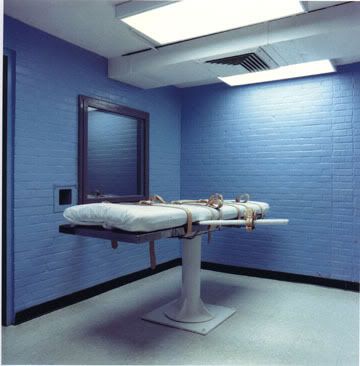This is an Open Thread: Everything Is On Sale
RAWALPINDI, Pakistan (CNN) — Pakistan former Prime Minister Benazir Bhutto was targeted in a deadly suicide bombing Thursday. Media reports quote her husband saying she suffered a bullet wound to the neck in the attack.
The attack has left at least 14 dead and 40 injured, Tariq Azim Khan, the country’s former information minister, told CNN in a telephone interview.
Bhutto’s husband, Asif Ali Zardari told CNN affiliate Geo TV that his wife was shot in the neck in the attack.
The attacker is said to have detonated a bomb as he tried to enter the rally where thousands of people gathered to hear Bhutto speak, police said.
USA
U.S. Ruling Backs Benefit Cut at 65 in Retiree Plans
WASHINGTON – The Equal Employment Opportunity Commission said Wednesday that employers could reduce or eliminate health benefits for retirees when they turn 65 and become eligible for Medicare.
The policy, set forth in a new regulation, allows employers to establish two classes of retirees, with more comprehensive benefits for those under 65 and more limited benefits – or none at all – for those older.
More than 10 million retirees rely on employer-sponsored health plans as a primary source of coverage or as a supplement to Medicare, and Naomi C. Earp, the commission’s chairwoman, said, “This rule will help employers continue to voluntarily provide and maintain these critically important health benefits.”
Democrats Enter Stretch in Iowa
As Clinton Emphasizes Experience, Obama and Edwards Call for Change
MOUNT PLEASANT, Iowa, Dec. 26 — With just eight days left to break a three-way deadlock in the Democratic contest here, Sen. Hillary Rodham Clinton began delivering a closing argument Wednesday that centered on the experience she and her husband gained in the Oval Office during his administration, while her two chief rivals both argued that they could best succeed in bringing change to Washington.
The issues of experience and change have defined the Democratic race for nearly a year, and the dichotomy continued to dominate as the three Democratic front-runners hit the campaign trail running after a Christmas break. Sen. Barack Obama (Ill.), who plans to make his endgame pitch in a speech on Thursday, urged voters to ask themselves, “Do you believe in change?” Former senator John Edwards (N.C.) detoured through New Hampshire before a planned return to Iowa, arguing that his is a more radical call for change than Obama’s. Clinton and Obama are launching television ads in the state to bolster their arguments as the three remain tightly bunched in surveys.
Military thinks twice on fortified trucks
Gates insisted on the MRAP vehicles. But they’re ill-suited to Iraq, some say, and may even be counterproductive if troops don’t ‘get out and walk.’
WASHINGTON — It was just what American soldiers had been longing for — a patrol vehicle designed to withstand the powerful roadside bombs that have killed more service members than any other insurgent weapon in the Iraq war.
But as the Defense Department hits its year-end goal of delivering 1,500 heavily armored, V-hulled “mine-resistant ambush-protected” trucks to Iraq, the feeling in the Pentagon is far from elation. Instead, an intense debate has broken out over whether the vehicle that is saving lives also could undermine one of the most important lessons of the whole war: how to counter an insurgency.
Though offering needed armor, the MRAP lacks the agility vital to urban warfare. “It’s very heavy; it’s relatively large; it’s not as maneuverable as you’d like it to be,” Gen. William S. Wallace, the officer in charge of Army doctrine and training, said recently. “All of those things should be of concern.”
Africa
Kenyans vote in tight race
Long queues of voters are waiting to cast their ballots, as Kenyans choose a president in an atmosphere marred by accusations of poll rigging.
President Mwai Kibaki is seeking a second term, in what is seen as the tightest election in Kenya’s history.
Turnout seems to be high in many areas but voting has been delayed for hours in parts of the Nairobi slum of Kibera.
Mr Kibaki’s closest challenger Raila Odinga has not been able to vote in Kibera – his parliamentary seat.
There were problems with the voters’ roll for names starting with “R” and “O”, although the Electoral Commission of Kenya (ECK) said a new register would be issued shortly.
Death toll in Egypt building collapse rises to 23
CAIRO (Reuters) – The death toll from the collapse of a 12-storey residential building in Egypt’s Mediterranean city of Alexandria rose to 23 on Thursday, security sources said.
Rescue workers have brought out three survivors from the rubble since Monday when the building collapsed, they said.
Authorities had said they thought 25 to 30 people were buried under the rubble when the building collapsed.
The building disintegrated on Monday as construction workers carried out repairs on the first floor.
It was constructed as a seven-storey building in 1982 without a permit, authorities said. The owner obtained a permit later but then illegally added five stories.
Middle East
Abbas wants settlement freeze at summit
JERUSALEM – Palestinian President Mahmoud Abbas will demand Israel commit to a freeze on all settlement construction at a peace summit Thursday, the first since the two sides agreed to resume peace talks at a U.S.-sponsored conference last month.
On Wednesday, Abbas appealed to Secretary of State Condoleezza Rice to press Israel on the construction issue, Abbas aide Nabil Abu Rdeneh said. A State Department spokesman said Rice called both Abbas and Israeli Prime Minister Ehud Olmert and urged them to make progress toward an agreement.
Israel announced last month that it was building 307 new apartments in Har Homa, part of a ring of Jewish neighborhoods around east Jerusalem where about 180,000 Israelis live, and Palestinians are demanding that Israel halt the project.
Israel, which annexed east Jerusalem after capturing it along with the West Bank in 1967, does not accept demands to limit its construction there.
Iraqi cabinet backs pardon for thousands of detainees
The Iraqi cabinet approved a draft law yesterday that will offer a general pardon to thousands of prisoners in US military and Iraqi custody, a government spokesman said.
“The cabinet has passed the general pardon law, which will define who is eligible to be freed from all prisons, both Iraqi and American,” spokesman Ali al-Dabbagh told Reuters.
Iraq’s national security adviser, Mowaffaq al-Rubaie, said earlier this month that the draft law was aimed at boosting reconciliation between majority Shia and Sunni Arab Muslims, locked in a cycle of violence. The issue of detainees is one of the most sensitive, especially as detentions have soared since military operations were stepped up this year. The Iraqi authorities now hold 24,000 detainees and US forces 26,000. Only a small proportion of those held are ever prosecuted.
Elsewhere in Iraq yesterday, Turkish aircraft attacked eight suspected Kurdish rebel hideouts in the north of the country, the third cross-border air assault in 10 days, Turkey’s military said.
Europe
Serb MPs threaten to cut ties with EU
Serbia is heading towards international isolation with the adoption of a parliamentary resolution to sever diplomatic ties with the United States and European Union countries if they recognise independence for the province of Kosovo.
The document debated yesterday says that Serbia must “reconsider” diplomatic ties with Western countries that recognise Kosovo’s statehood.
The resolution, created under the nationalist Prime Minister, Vojislav Kostunica, also said that Serbia must “act efficiently to protect the lives and property” of non-Albanians in Kosovo if it proclaims independence, but falls short of mentioning any military options.
Engineers check the Queen Victoria is shipshape for her maiden voyage
MALAGA The bow of Cunard’s new liner the Queen Victoria is examined by specialists carrying out safety checks before sailing on her maiden voyage.
Weighing 90,000 tonnes, the Queen Victoria, which was christened by the Duchess of Cornwall in Southampton earlier this month, is the second-largest vessel the cruise line has constructed.
Currently berthed in Malaga, the ship is expected to set sail for New York on January 6 where she will drop anchor alongside two of the world’s most celebrated liners – the Queen Mary 2, Cunard’s largest liner, and the Queen Elizabeth 2. The rare meeting of three nautical giants, lit by fireworks against the backdrop of the Statue of Liberty, is expected to attract New Yorkers as well as maritime enthusiasts from around the world. It will also be one of the last outings for Queen Elizabeth 2, Cunard’s longest-serving liner, which is expected to be retired next November.
After visiting New York, the Queen Victoria will go on to complete a round-the-world cruise, tickets for which cost about £12,000.
The facilities on the luxurious ship include seven restaurants, 13 bars, three swimming pools, a ballroom and a theatre.
Asia
Hindu extremists burn down village churches
By Ashok Sharma
Published: 27 December 2007
Hindu extremists attacked Christians celebrating Christmas in eastern India, ransacking and burning at least six village churches. One person was killed.
Four hundred and fifty police were deployed to quell the violence in the remote district of Orissa state where the churches – most nothing more than mud and thatch houses – were attacked. The violence had eased by yesterday.
There were conflicting reports of what sparked the unrest in Orissa, which has a history of violence against the state’s tiny Christian minority. Some reports said Christians had attempted to attack a hardline Hindu leader of the Vishwa Hindu Parishad group, who led an anti-conversion movement.
“The situation was aggravated by some Christians forcibly stopping the 80-year-old Hindu leader Laxmanananda Saraswati and attempting to attack him,” said Giriraj Kishore of the VHP. “When they were prevented from attacking him by his followers, the Christians hit someone with an axe and one Hindu died,” he said.
Diplomats to leave Afghanistan as new ‘Great Game’ played with tribal leaders
By Jerome Starkey in Helmand, Afghanistan
Published: 27 December 2007
Two senior diplomats are to fly out of Afghanistan today after being accused of talking to the Taliban, despite international pressure to let them stay.
The expulsion of Michael Semple, an Irishman who is acting head of the EU mission, and Mervin Patterson, a Briton who is the third-ranking UN official in Kabul, has shed light on the murky world they inhabit in the search to bring peace to a trroubled land.
For spies, diplomats and soldiers in Afghanistan are playing the Great Game today as much as their forefathers ever did.
Six years ago some military commanders believed they could beat the Taliban and stamp harmony on Helmand by force – but not any more. Titanium-plated Apache gunships, designed to fight the might and military sophistication of Soviet Russia, can still annihilate ragtag gunmen hired to fight for a few dollars a day. Heat-seeking javelin rockets designed to hit T72 tanks tearing across Europe are very good at finding insurgents cowering in compounds. Marines call it “throwing a Porsche at them”, because the missiles cost £65,000 a pop. But there is a profound realisation in Afghanistan that victory will never be achieved by fighting alone. “We are going to have to sit down and do business with people who we don’t like, and who don’t like us,” said one diplomat.
Latin America
Colombia OKs Venezuelan role in hostage release
Hugh Chavez’s representatives will be allowed to take custody of kidnapping victims from leftist rebels.
BOGOTA, COLOMBIA — In an unusual twist to an ongoing hostage saga, President Alvaro Uribe has agreed to let emissaries of Venezuelan President Hugo Chavez travel to the Colombian jungle to take custody of three kidnapping victims set for release by their leftist rebel captors.
The exchange could take place as early as today. The Revolutionary Armed Forces of Colombia, or FARC, said last week that it would release hostages to Chavez if the logistics could be worked out.
Hostages to be released include former presidential campaign manager Clara Rojas and her young son Emmanuel, who was born in captivity. Rojas was abducted in 2002 along with her boss, presidential candidate Ingrid Betancourt, who remains a captive. Former Colombian legislator Consuelo Gonzalez is also to be released.
FARC’s offer to release the prisoners, who are among 45 political hostages in rebel custody, came weeks after Uribe abruptly ended mediation efforts by Chavez to secure the release of prisoners. Uribe said that Chavez had broken protocol by talking to a Colombian military leader.




















